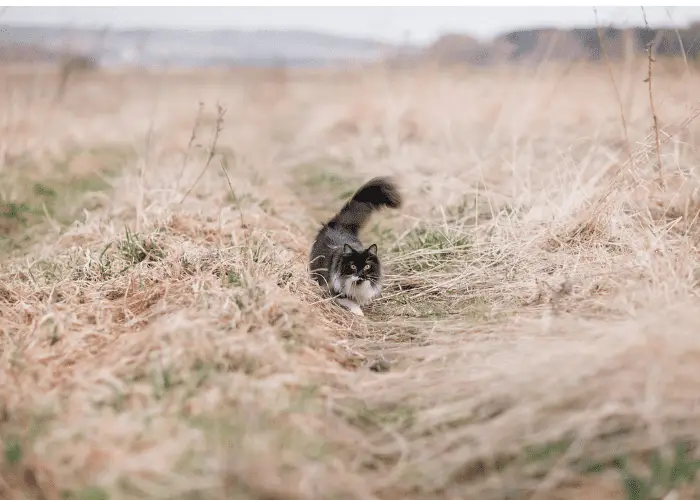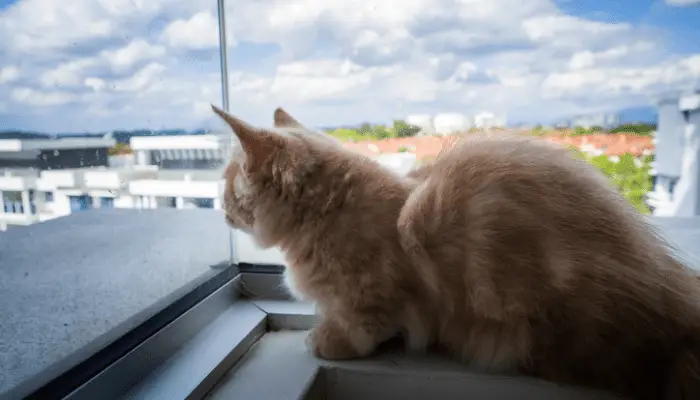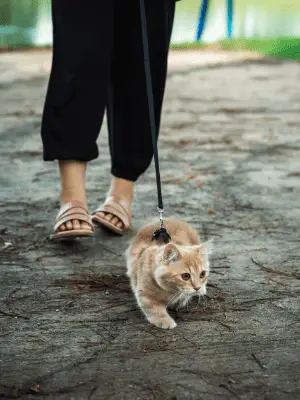This article contains affiliate links, and we may earn a commission at no cost to you if you choose to purchase through these links. I never recommend products that I do not trust or will not advise my veterinary clients and patients to use.

Munchkin cats with cute stubby legs are at an apparent athletic disadvantage compared to their longer-leg feline counterparts. Predators, feral cats, diseases, toxins, and road traffic, to name only a few of the dangers that cats face outdoors. Munchkins may not be apt to navigate all these dangers on their own.
Munchkin cats should be kept indoors only. Due to their short legs, they are not very well able to escape dangers such as predators, road traffic, or feral cats defending their territory by jumping or climbing. In addition to physical hazards, allowing your Munchkin to roam outdoors will expose them to diseases such as Feline Aids, Leukemia- and Infectious Peritonitis virus that is spread by roaming cats.
Believe it or not, it was not until the 1950s that keeping a cat indoors became common practice with the introduction of cat litter. It is only in recent years that keeping cats indoors has been encouraged as we place more value on our beloved cats’ health.
As gusto and as your little Munchkin may appear playing on your living room carpet, they are not very streetwise, and the outdoors pose a much greater risk to these short-legged cuties.
1. Munchkins Cannot Jump Very High
Munchkins’ short legs mean that they have limited ability to jump. How high a Munchkin can jump depends on the length of their legs, with front leg length in Munchkins categorized into three broad categories, namely standard (3-4 in.), super short (2-3 in.), and rug hugger (less than 2 in.).
The standard length Munchkin can jump roughly 35 inches high (90 cm). This means that if a munchkin finds itself in a yard with a dog, it will not be able to jump onto a fence or climb a tree to escape the danger.
Due to this fact, it may be more plausible to contain a Munchkin within a yard; however, Munchkins should never be left to roam a yard unsupervised as cats are inclined to climb and explore. Your Munchkin may just figure out a way to climb out of your yard if you don’t keep a close eye on them.
I go into more detail on ways to let a Munchkin enjoy the outdoors safely later in this article.
2. Munchkins Cannot Run Very Fast
Munchkins can definitely run fast, but it will be no match compared to the speed that predators, feral cats, or dogs can reach.
Unfortunately, leg length and body weight to strength ratio will undeniably influence the speed, no matter what species you are.
3. Munchkins Are Not Well Equipped To Defend Themselves Against Territorial Feral Cats
Cats are territorial by nature, and disputes when one cat finds an unwelcome feline foe in its territory are bound to happen. Unfortunately, these fights often leave the loser with multiple bite wounds that later turn into painful abscesses.
If your Munchkin meets the large ginger tom roaming the neighborhood, it is unlikely to be a fair fight, and your Munchkin will likely leave the fight with multiple bite and scratch wounds.
4. Free-Roaming Cats Spread Diseases
Feline Aids or Feline Immunodeficiency virus is a potentially deadly disease with no vaccine and no cure. Free-roaming cats most commonly spread it through fight wounds.
This is only one of the many diseases that can be spread from one cat to another (others include Feline leukemia virus, Feline Calicivirus, and Feline Coronavirus). All of which treatment is not always successful.
Vaccinating your cat will help provide them with immunity (chat to your vet about which vaccines your Munchkin needs) against some of these diseases, but avoiding unnecessary exposure is always the safest bet.
5. Free-Roaming Cats Cause Unwanted Litters
An unneutered or unsterilized cat that is not kept indoors will inevitably result in unwanted litters of kittens. Cats are great at finding mates to reproduce with and only need half a chance to breed.
Saying that our local cat rescue volunteers have their hands full during the summer months is an understatement. They are often inundated with litters of unwanted or abandoned kittens that need to be bottle-fed every few hours throughout the night for weeks on end.
The feral cat population is hard to control once it gets out of hand, and pet shelters can hardly handle the current cat population crisis. Please don’t let your cat contribute to the massive cat population problem worldwide. There are already too many cats who do not get to live in a comfy home where an owner takes good care of them.
6. Humans Are Not Always Kind To Roaming Cats
By far, the scariest predator of them all is humans. Unfortunately, not all neighbors are friendly to the local roaming cat, and pellet gun wounds are a common injury to outdoor cats – and that is the cats that are lucky enough to reach the vet.
Some humans may see roaming cats as a pest, and poisoning ferals are common in some neighborhoods.
It is also not unheard of that people will take in and keep free-roaming cats just because they think the cat is attractive. Just imagine how distressing this will be if your cat is taken away from all that is familiar to them and kept in a new environment.
7. Indoor-Only Cats Live Longer
Multiple longevity studies in cats have found a strong correlation between being kept indoors only and a longer life span. There are numerous reasons why this is the case.
Indoor-only cats are not only less likely to get injured, contract disease, or be poisoned, but owners of indoor-only cats are also more likely to pick up on symptoms of illness and seek veterinary care.
In addition, older cats become more susceptible to injuries as their agility declines which translates into a reduced life expectancy when roaming outdoors.
8. Munchkins Are Not Streetwise
Studies showed that kittens that are feral or free-roaming from a young age are more likely to successfully dodge some of the dangers associated with free-roaming such as road traffic. In addition, younger cats (younger than 24 months) are more likely to be involved in road traffic incidents.
Cats that are not used to road traffic may not realize the danger of fleeing across a busy road when spooked or escaping from danger.

The Downsides Of Keeping Your Munchkin Indoors
Indoor-only life may be more monotonous and provide less opportunity for cats to express instinctual behavior such as roaming and hunting, which may cause cats to become bored or frustrated.
Cats confined indoors may also see free-roaming cats from time to time and experience frustration due to not being able to chase unwelcome cats away from their territory.
This means that indoor-only cats are more likely to suffer from behavior problems related to a lack of environmental stimulation or an inability to express instinctive behavior such as hunting, guarding territory and climbing, or roaming.
Therefore, indoor-only cat owners have a great responsibility resting on their shoulders to provide their cats with opportunities to express natural behavior and provide environmental stimulation.
The article by Herron and Buffington (2014) on Environmental Enrichment for Indoor Cats provides helpful solutions to this problem.
The challenge of boredom and reduced ability to express natural behavior can easily be remedied by providing environmental enrichment in the form of scratch posts, toys, and vertical climbing areas to a lookout point in the home, such as a cat tree or window perch.
How Can I Let My Munchkin Safely Enjoy The Outdoors?
Of course, keeping your Munchkin indoors will not eliminate the dangers they may face as there are many hazards inside a home as well. However, keeping your cat indoors dramatically reduces the likelihood of potentially life-threatening injuries and diseases.
Alternatively, we can provide our Munchkins with controlled and supervised exposure to the outdoors that will eliminate most of the dangers associated with the outdoors.
Never let your Munchkin go outside without close supervision.
This is especially true if you do not have a fence that you are 100% sure will contain your Munchkin within the yard.
Here are a few ways you can provide your Munchkin with some of the outdoors without the associated risks:
Catio
The best option would be to build a small catio with lookout points and sun spots attached to your house. This way, your Munchkin will be able to see what is going on outside without being exposed to the dangers of the great outdoors.
You can buy a large enough enclosure to contain some toys and climbing areas and place it outdoors. Check out this example on Amazon.
Cat Harness
A good alternative is to introduce a harness to your Munchkin. Make sure it fits snuggly without being uncomfortable and be sure to introduce it slowly over a few days and never force u=your Munchkin into it. The harness should be associated with a positive experience.
By holding onto your Munchkin’s harness while spending time outdoors with them, you will be able to allow them to sniff and explore but still keep them safe from predators and prevent them from running away if something spooks them.

Cat Stroller or Backpack
Cat strollers and cat backpacks are excellent alternatives if you want to let your Munchkin have a taste of the great outdoors. The backpack and the stroller can be compared to a comfy cat carrier in the form of a stroller or backpack.
Again, a slow introduction with lots of positive reinforcement using treats and cuddles is needed to help your mUnchkin associate the stroller and backpack with a positive experience.
Conclusion
Munchkins should never be allowed outdoors without close supervision. There are many dangers associated with roaming outdoors that Munchkins are not well equipped to handle.
Instead, provide your Munchkin with environmental enrichment indoors by providing them with cat trees, window perches, and scratching posts.
You may also find the following articles helpful:
- How High Can Munchkin Cats Jump? Can They Get Onto Counters?
- Will Munchkin Cats Land On Their Feet When Falling?
- What Type Of Litter Box Do Munchkins Need?
References
- Clancy, E., Moore, A. and Bertone, E., 2003. Evaluation of cat and owner characteristics and their relationships to outdoor access of owned cats. Journal of the American Veterinary Medical Association, [online] 222(11), pp.1541-1545. Available at: <https://avmajournals.avma.org/view/journals/javma/222/11/javma.2003.222.1541.xml>.
- Foreman-Worsley, R. and Farnworth, M., 2019. A systematic review of social and environmental factors and their implications for indoor cat welfare. Applied Animal Behaviour Science, [online] 220, p.104841. Available at: <https://www.sciencedirect.com/science/article/abs/pii/S0168159119301054>.
- Goodman Milne, E., 2018. Time to stop accepting ‘normal for the breed’. Veterinary Record, [online] 183(20), pp.630-630. Available at: <https://www.proquest.com/openview/f1c1145faca78bc335257ebb61763e0e/1?pq-origsite=gscholar&cbl=2041027>.
- Gustafsson, K., 2015. Genetics ANd Phenotypes Of Chondrodysplasia (Achondroplasia) Across Domestic Animal SPecies. Szent Istvan University Faculty Of Veterinary Science Budapest, [online] Institute for Animal Breeding, Nutritional Laboratory Animal Science, Department of Veterinary Genetics and Animal Breeding. Available at: <http://www.huveta.hu/bitstream/handle/10832/1360/GustafssonKristinaThesis.pdf?sequence=1&isAllowed=y>
- Herron, M. E., & Buffington, C. A. (2010). Environmental enrichment for indoor cats. Compendium (Yardley, PA), 32(12), E4. Available at: <https://www.ncbi.nlm.nih.gov/pmc/articles/PMC3922041/>
- L.A. Lyons, D.B. Fox, K.L. Chesney, L.G. Britt, R.M. Buckley, J.R. Coates, B. Gandolfi, R.A. Grahn, M.J. Hamilton, J.R. Middleton, S.T. Sellers, N.A. Villani, S. Pfleuger, Localization of a feline autosomal dominant dwarfism locus: a novel model of chondrodysplasia, the 99 Lives Consortium, bioRxiv 687210; Available at: <https://doi.org/10.1101/687210>
- Ravi, M., Wobeser, G. A., Taylor, S. M., & Jackson, M. L. (2010). Naturally acquired feline immunodeficiency virus (FIV) infection in cats from western Canada: Prevalence, disease associations, and survival analysis. The Canadian veterinary journal = La revue veterinaire canadienne, 51(3), 271–276. Available at: <https://www.ncbi.nlm.nih.gov/pmc/articles/PMC2822370/>
- Shyan-Norwalt, M., 2005. Caregiver Perceptions of What Indoor Cats Do “For Fun.” Journal of Applied Animal Welfare Science, [online] 8(3), pp.199-209. Available at: <https://www.tandfonline.com/doi/abs/10.1207/s15327604jaws0803_4>.
- Tan, S., Stellato, A. and Niel, L., 2020. Uncontrolled Outdoor Access for Cats: An Assessment of Risks and Benefits. Animals, [online] 10(2), p.258. Available at: <https://www.mdpi.com/2076-2615/10/2/258>.

